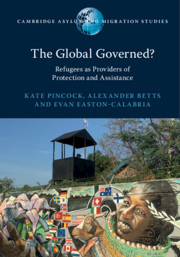Crossref Citations
This Book has been
cited by the following publications. This list is generated based on data provided by Crossref.
Easton-Calabria, Evan
and
Wood, Jennifer
2021.
Bridging, bonding, and linking? Syrian refugee-led organisations and integration in Berlin.
Journal of Ethnic and Migration Studies,
Vol. 47,
Issue. 19,
p.
4308.
Pincock, Kate
2021.
UNHCR and LGBTI refugees in Kenya: the limits of ‘protection’.
Disasters,
Vol. 45,
Issue. 4,
p.
844.
Betts, Alexander
Omata, Naohiko
and
Sterck, Olivier
2021.
Transnational blindness: International institutions and refugees’ cross-border activities.
Review of International Studies,
Vol. 47,
Issue. 5,
p.
714.
Pincock, Kate
Betts, Alexander
and
Easton-Calabria, Evan
2021.
The Rhetoric and Reality of Localisation: Refugee-Led Organisations in Humanitarian Governance.
The Journal of Development Studies,
Vol. 57,
Issue. 5,
p.
719.
Sutton, Rebecca
2021.
Participatory Action Research with Youth Displaced by War: How Youth Know, Feel and Do Peace and Security.
SSRN Electronic Journal,
Madon, Shirin
and
Schoemaker, Emrys
2021.
Digital identity as a platform for improving refugee management.
Information Systems Journal,
Vol. 31,
Issue. 6,
p.
929.
Speed, Francesca
Scurry, Tracy
Edward, Peter
and
Moufahim, Mona
2021.
Networks Amongst Syrians: Situated Migrant Positionalities and the Impact on Relational Embedding.
Social Inclusion,
Vol. 9,
Issue. 4,
p.
243.
El Masri, Yafa
and
Minoia, Paola
2022.
Campi profughi come spazi di soccorso in tempo di Covid-19: mobilità invisibili a Bourj Albarajenah.
RIVISTA GEOGRAFICA ITALIANA,
p.
5.
Klassen, Amanda
2022.
From Vulnerability to Empowerment: Critical Reflections on Canada’s Engagement with Refugee Policy.
Laws,
Vol. 11,
Issue. 2,
p.
22.
Benson, Odessa Gonzalez
2022.
Shadows of the shadow state: Grassroots, refugee-led organizations within a multi-scalar and contested resettlement institutional domain.
Environment and Planning C: Politics and Space,
Vol. 40,
Issue. 8,
p.
1745.
Allen, William L
and
Easton-Calabria, Evan
2022.
Combining Computational and Archival Methods to Study International Organizations: Refugees and the International Labour Organization, 1919–2015.
International Studies Quarterly,
Vol. 66,
Issue. 3,
Richlen, Lisa
2022.
The Constructive Influence of the Homeland in Refugee Organizing: Darfurian Asylum Seekers in Israel.
Journal of Refugee Studies,
Vol. 35,
Issue. 3,
p.
1250.
Gonzalez Benson, Odessa
Routte, Irene
Pimentel Walker, Ana Paula
Yoshihama, Mieko
and
Kelly, Allison
2022.
Refugee-Led Organizations' Crisis Response during the COVID-19 Pandemic.
Refuge: Canada's Journal on Refugees,
Vol. 38,
Issue. 1,
p.
62.
Bradley, Megan
2023.
Realising the Right of Return: Refugees’ Roles in Localising Norms and Socialising UNHCR.
Geopolitics,
Vol. 28,
Issue. 3,
p.
979.
Kortendiek, Nele
and
Oertel, Joseph
2023.
Caught between Vulnerability and Competence – UNHCR’s Visual Framing of Refugees, Economic Threat Perceptions and Attitudes toward Asylum Seekers in Germany.
Journal of Immigrant & Refugee Studies,
p.
1.
Yasmin, T.
Dhesi, S.
Kuznetsova, I.
Cooper, R.
Krause, S.
and
Lynch, I.
2023.
A system approach to water, sanitation, and hygiene resilience and sustainability in refugee communities.
International Journal of Water Resources Development,
Vol. 39,
Issue. 5,
p.
691.
Leon, Lucy
and
Rosen, Rachel
2023.
Unaccompanied migrant children and indebted relations: Weaponizing safeguarding.
Child & Family Social Work,
Vol. 28,
Issue. 4,
p.
1056.
Aden, Hassan
2024.
Localised refugee education: understanding nationally accredited refugee-led schools in Kenya’s Dadaab camps.
Journal of Eastern African Studies,
Vol. 18,
Issue. 3,
p.
388.
Kaplan, Oliver
and
Rhoads, Emily Paddon
2024.
How Insider-Led Processes Lead to Localization: The Case of Digital Technology and Humanitarian Protection.
Global Studies Quarterly,
Vol. 5,
Issue. 1,
Erdilmen, Merve
Milner, James
and
Bradley, Megan
2024.
Through the Localization Looking Glass: Seeing Subaltern Power in the Refugee Regime.
Global Studies Quarterly,
Vol. 5,
Issue. 1,



